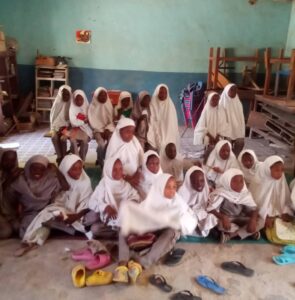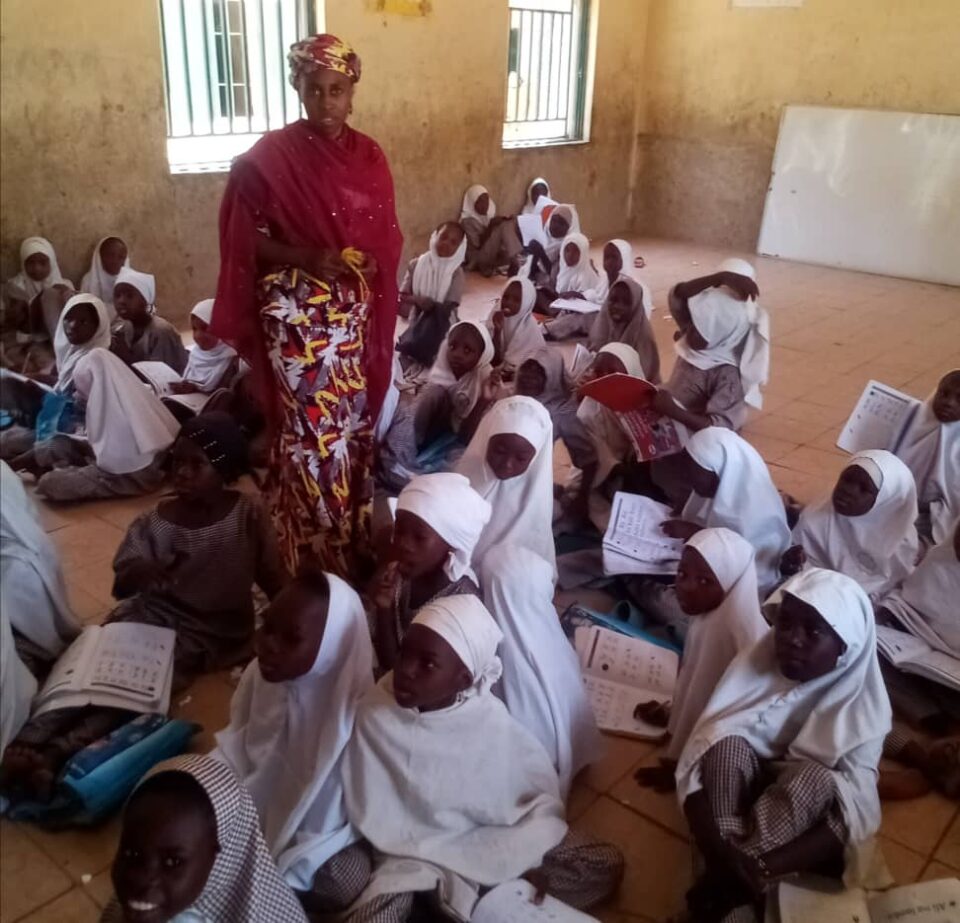The coming into force of child rights law in Kano appears to be the necessary spark needed to take more children from the streets to the classroom, FELIX KHANOBA reports.
“I can now read, let me read for you (sic),” Aisha Ibrahim said with a thick Hausa accent as she sprang up excitedly from a learning mat alongside her classmates to welcome ‘unknown visitors’ to her classroom.
If Aisha was trying to project a sense of academic intelligence amidst her shy deluged classmates, the 11-year-old did not fail in her delivering as she clearly read out memorised texts to the admiration of all.
The primary five pupil was one of the boldest to speak out of her journey from the streets to the classroom.
She was among the pupils of Brigade Girls Model Primary School, who before now a regular face in the highly congested streets of Gawuna ward of Kano. Her main engagement was hawking of groundnut and other consumables with many other children. But Aisha decided to ditch the abusive enterprise for the classroom.

Now she is happily back to school after it was dawn on her parents that Aisha was getting more exposed to dangers during hawking amid reported cases of many young girls falling into the hands of evil men who lured and defiled them under the guise of buying their items.
Heart-rending stories also abound of young hawkers losing their hard-earned sales to pickpockets and other criminals who often take advantage of their innocence and lack of strength to fight back.
But Aisha is now hopeful that with the coming on board of child rights law in Kano would see many parents and other stakeholders act fast by ensuring her friends who still toil on the streets almost on daily basis are shown the way to the classroom.
“I want to be a doctor, I also want my friends to be in school,” Aisha told this reporter who visited her school alongside other colleagues during a media dialogue on the status of implementation of the Child Rights Law across the country organised by the Child Rights Information Bureau (CRIB), Federal Ministry of Information and Culture in collaboration with United Nations Children’s Fund (UNICEF).
The headteacher , Mrs Hauwa Abdullahi, said Brigade Girls Model Primary School, was established in 1971 as Brigade Special Needs School but was converted to only girls primary school in 2002 as a result of growing number of out-of-school female children in the area.
The school, which currently boasts of 579 pupils is still far from meeting its goal of taking young female children in the area off the streets, as many were still seen either begging for alms or hawking not far from the school premises, in what Hauwa blamed on poverty.

“It is poverty,” Hauwa said, “Even some of the girls (pupils) here had to help before coming to school. They have to look for what they will eat. Some come to school without taking breakfast.”
The headteacher, who commended UNICEF for supporting the school with instructional materials, said the child rights law would take more children away from the streets.
UNICEF Child Protection Specialist in charge of Kano office, Fatimah Adamu, said the child rights law protects all children, even those who are living on the streets.
“Children should not be on the street in the first place, let alone fend for themselves. The role of protection which includes access to services is for duty bearers. They and the government.
“Except for Bauchi state, which has not yet passed, 35 states in Nigeria, including the Federal Capital Territory (FCT), have ratified the Child Rights Act.
“There are different reasons hindering the execution of the Act but first, there is a need to develop an implementation plan and associate policies for states who have passed it.”
Rabiu Muktar, Education Secretary in charge of all basic schools in Nasarawa Local Government Area of Kano, including Brigade Girls Model Primary School, remains upbeat that the child right law will be implemented effectively to bring more children to school.

Rabiu Muktar, Education Secretary, Nasarawa Local Government
He said Nasarawa local education authority, has already put into practice elements in the child rights law.
“We are already on that process, especially in the issue of punishment, the right of learners by the teachers. You cannot go to school now and see a teacher holding a cane beating children.
“We are making the schools conducive for the learners, you can’t see a teacher insulting a learner, if such happens, we will take the teacher to guidance and counselling session so he can be counselled,”he said.
Muktar also revealed that there has been massive positive change in parents’ orientation, saying many now allow their female wards to attain higher level of education.
“Our people are now oriented, they (female students now ) obtain senior secondary education before they are married. After marriage, they will stay with their husbands who send them to tertiary institutions, that is the system now,” he said.
But despite expressing delight over the new law in Kano, UNICEF is not relenting in its quest to ensure its effective implementation.
Rahama Farah, UNICEF chief of field office in Kano, said signing the bill is a great advantage to the children and urged the new governor, Abba Yusuf, to allocate adequate resources for effective implementation of the law.
“The Kano state child protection law is a remarkable achievement that benefits the children and people of Kano. It establishes a legal framework to ensure the protection of children’s rights within the state.
“Now that the law has been established, it is crucial to allocate the necessary resources and establish mechanisms for its effective implementation.
“The implementation of the law has become in the interest of the children,” Rahama said in a statement.
Many believe that with Kano joining the league of states that have successfully incorporated the Nigeria child rights act into their legal frameworks, issues like out-of-school children, poor sanitation, birth registration, among others, which have been regularly championed by UNICEF would get more serious attention from the government.



